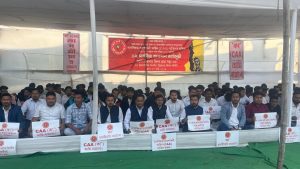In recent weeks, India’s northeastern state of Assam has been rocked by protests against the controversial Citizenship (Amendment) Act 2019 (CAA). On March 12, 16 opposition parties led by the Congress party declared a state-wide strike, while another grouping of 30 non-political organizations, including the All Assam Students Union (AASU), called for peaceful mass protests. Copies of the CAA notification have also been burnt in many places.
The Assam government has sounded a high alert and stepped up deployment of police personnel in sensitive districts. The police commissionerate in Guwahati issued notices to leaders of the protesting parties and organizations to withdraw the strike and “cooperate in maintaining peace in the state,” otherwise legal action would be initiated against them.
The government is keen to prevent a repeat of the violence that swept large swathes of Assam and other parts of the frontier region in 2019, when protests erupted against the CAA. The violence in 2019 had left five persons dead.
Among the eight northeastern states in India, the anti-CAA agitation is most intense in Assam, as the other states have been assured some immunity from the controversial law. Compared to the protests that erupted in 2019, this time around the issue has failed to elicit a response from the people as shops and markets remained open in the capital city and other places during the strike.
The CAA was passed by the Indian Parliament in 2019 but the BJP-led government implemented it only on March 11 this year, weeks ahead of the general elections to reap electoral benefits.
The CAA amended the Citizenship Act 1955 to fast-track the process of citizenship for a section of Hindu, Sikh, Buddhist, Jain, Parsi, and Christian migrants from Afghanistan, Bangladesh, and Pakistan. The new law relaxes the 11 years of residence required under the Citizenship Act of 1955 to five years for people belonging to the specified categories, provided they entered India before December 31, 2014.
The Act makes no mention of Muslims who came to India from the neighboring countries. This has triggered protests in other Indian states. But in the country’s Northeast and especially in Assam, the reason for the agitation over the CAA is different.
People in the Northeast are opposed to the CAA as they feel that refugees and immigrants pose a threat to the language, culture, and demography of the indigenous population.
In the case of Assam, the CAA dilutes the Assam Accord of 1985, which had fixed March 24, 1971, as the cut-off date for determining citizenship irrespective of religious affiliations. With the CAA, the 1971 deadline for Assam has been extended now to 2014, which means that hundreds of thousands of non-Muslim foreign nationals from Bangladesh will be allowed to settle legally in the state.
No state in India has witnessed as much turmoil over citizenship and bloody agitations against foreign nationals as Assam.
The Assam movement’s genesis can be traced to the pre-independence period when the British colonial regime recruited Bengalis in large numbers for clerical posts. Subsequently, from around the early decades of the 20th century, Muslim peasants from east Bengal were settled to enhance the agricultural yield. The relocation of people, both Hindu refugees and Muslim immigrants, continued after India’s independence in 1947.
In 1979, civil society groups led by the All Assam Students’ Union (AASU) launched a six-year agitation to resolve the illegal immigration and citizenship issues. The agitation ended with the signing of the Assam Accord by the government of India and leaders of the Assam movement.
However, there was no serious effort by the government to detect foreign nationals in the state nor any willingness to check further infiltration from Bangladesh.
Subsequently, another accord was inked by the government and the AASU in 2005 stipulating the update of the National Register of Citizens (NRC), which was first done in 1951.
Again, the government was reluctant to fulfill its commitment to update the NRC, prompting an NGO called Assam Public Works to lodge a petition in the Supreme Court.
In 2013, the apex court ordered the update of the NRC, which was completed in 2019. The NRC, as it stands today, has snowballed into a major controversy since the update was ridden with errors and it is believed that hundreds of thousands of foreign nationals had enrolled their names through fraudulent means. It is believed that the CAA will enable a large section of Bangladeshi Hindus who were left out of the NRC to gain citizenship.
On March 11, the Narendra Modi government announced implementation of the CAA. Two days later, the AASU filed a writ petition again in the Supreme Court seeking a stay on the CAA. The petition underscored that the government’s notification of the rules for implementing the law contradicts the Assam Accord, the Citizenship Act, 1955, and defeats the purpose of the NRC.
Over 230 petitions have been filed in the apex court challenging the CAA over the past few years. The Supreme Court has issued a notice to the government seeking a response. The matter will be heard again on April 9.
The Ministry of Home Affairs has also issued a clarification saying that the CAA will not impact the citizenship of Indian Muslims who have “equal rights like their Hindu counterparts” and that no Indian citizen would be asked to produce any document to prove citizenship.
The precise outcome of the CAA in India remains to be seen. There is speculation that the process of granting citizenship to refugees could be tougher than imagined. In particular, analysts are of the view that the rule stipulating that those seeking benefits under the CAA will need to provide documents to prove that they were citizens of Afghanistan, Bangladesh, or Pakistan, and entered India before the cut-off date, could be a huge hurdle for a large section of the refugees.
The Supreme Court’s judgment on the petitions challenging the new law could also impact the overall outcome.

































